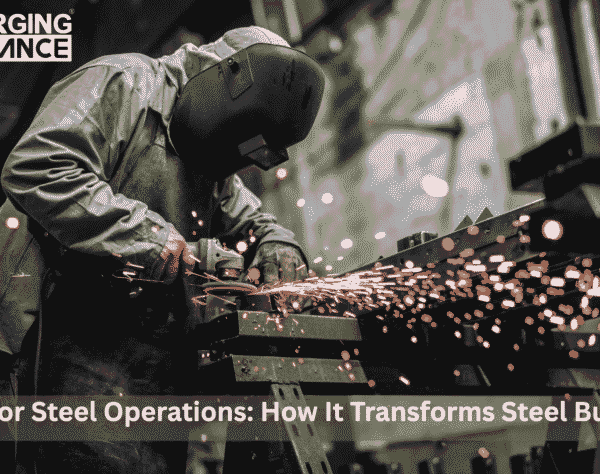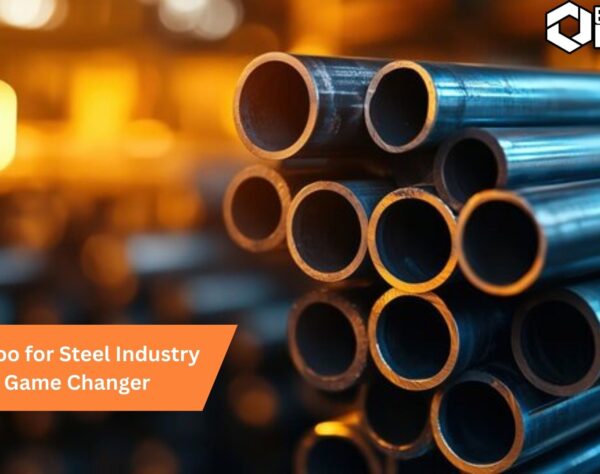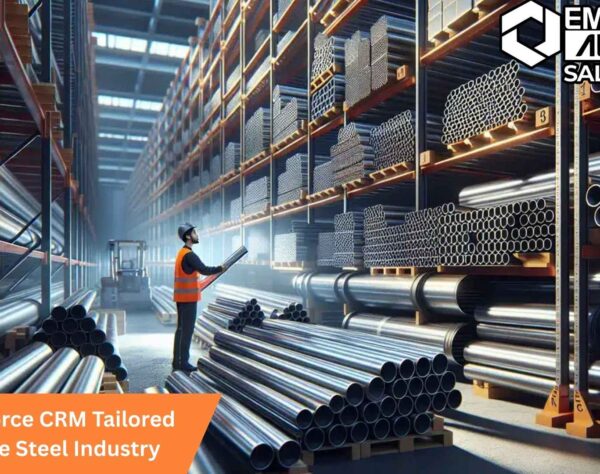
Steel Industry in Chennai? Time to Strengthen with Salesforce!

Forging Success: How Salesforce is Reinventing Chennai’s Steel Industry
The steel industry forms the backbone of Chennai’s industrial growth, supporting key sectors like construction, automotive, and infrastructure. Chennai, home to some of the largest steel manufacturers in India, has long been a hub for steel production and export. However, the industry faces increasing pressure to improve efficiency, reduce costs, and enhance customer satisfaction in a highly competitive global market.
Challenges like fluctuating raw material costs, complex supply chains, and inconsistent production processes make it difficult for steel companies to maintain profitability and operational efficiency. Additionally, customer demands for faster delivery, higher quality, and more personalized service are adding to the pressure.
This is where Salesforce steps in as a transformative solution. While many associate Salesforce primarily with customer relationship management (CRM), its capabilities extend far beyond that. For steel companies in Chennai, Salesforce provides a unified platform to manage supply chains, automate production workflows, improve customer interactions, and enable data-driven decision-making.
By integrating Salesforce into their operations, steel companies in Chennai can transform from reactive to proactive businesses — boosting efficiency, increasing profitability, and delivering better customer experiences. Let’s explore how Salesforce is strengthening the steel industry in Chennai and why it could be the key to future success.
Why the Steel Industry in Chennai Needs a Modern Solution
The steel industry is one of the most resource-intensive and operationally complex sectors. Steel manufacturers in Chennai face several critical challenges that require a modern, data-driven solution:
1. Complex and Disrupted Supply Chains
The steel supply chain is long and complex, involving raw material sourcing, transportation, manufacturing, and distribution. A single disruption at any point — whether it’s a delay in raw material delivery or a production halt — can have a ripple effect on the entire operation.
2. Rising Raw Material Costs
Fluctuating costs for raw materials like iron ore, coal, and scrap metal directly impact profitability. Without a system to monitor market trends and adjust pricing strategies, steel companies struggle to maintain stable profit margins.
3. Inefficient Production Cycles
Steel manufacturing involves multiple stages — melting, rolling, cutting, coating, and finishing. Without proper scheduling and real-time monitoring, production inefficiencies lead to increased costs, delayed deliveries, and wasted resources.
4. Poor Inventory Management
Steel manufacturers handle large inventories of raw materials and finished products. Overstocking increases storage costs, while understocking leads to production delays. Many companies rely on outdated tracking methods, causing discrepancies and missed production targets.
5. Limited Customer Engagement and Support
Steel companies often focus on production efficiency but overlook customer satisfaction. Slow order processing, inaccurate delivery timelines, and poor complaint resolution can lead to customer churn and loss of repeat business.
6. Lack of Data-Driven Insights
Without a centralized system for tracking production data, sales performance, and customer interactions, companies struggle to identify trends and make informed decisions. Decisions are often made reactively, not strategically.
Salesforce addresses all these challenges by providing a centralized platform where steel manufacturers can manage their entire business — from supply chain to sales — with real-time insights and automation.
How Salesforce Strengthens the Steel Industry in Chennai
1. Supply Chain Optimization – Streamlining from Raw Material to Delivery
Managing supply chains is one of the biggest challenges in the steel industry. Salesforce provides end-to-end supply chain visibility, allowing businesses to monitor raw material availability, production status, and delivery timelines in real-time.
🔹 Supplier Performance Tracking: Salesforce allows companies to track supplier reliability and delivery times, helping identify the best sources for raw materials.
🔹 Automated Procurement: The platform automatically triggers procurement orders based on stock levels and production schedules.
🔹 Predictive Supply Chain Management: Using AI, Salesforce predicts potential supply chain disruptions and suggests alternative solutions to prevent delays.
🔹 Reduced Lead Times: By improving coordination between suppliers and manufacturers, Salesforce reduces lead times and improves production flow.
For instance, a Chennai-based steel company reduced supply chain disruptions by 25% within six months of implementing Salesforce’s supply chain management module.
2. Inventory Management – Maintaining the Right Balance
Steel manufacturers handle massive inventories, including raw materials, semi-finished goods, and finished products. Salesforce helps maintain optimal inventory levels through automation and real-time tracking.
📦 Multi-Warehouse Tracking: Monitor inventory levels across multiple storage facilities from a single dashboard.
📦 Automated Stock Replenishment: Salesforce automatically places restocking orders when inventory levels drop below a certain threshold.
📦 Scrap and Waste Reduction: Track material usage and minimize waste through better inventory management.
📦 FIFO and LIFO Tracking: Salesforce supports FIFO (First-In-First-Out) and LIFO (Last-In-First-Out) models, ensuring accurate cost calculations and efficient stock rotation.
A Chennai-based steel supplier reduced inventory holding costs by 18% by switching to Salesforce’s automated inventory system.
3. Enhanced Production Scheduling and Automation
Steel production involves complex, multi-stage processes that require precise scheduling and execution. Salesforce automates production planning, helping companies reduce downtime and improve output.
✅ Automated Production Scheduling: Generate production schedules based on real-time demand and machine availability.
✅ Machine Utilization Tracking: Monitor equipment performance and downtime to prevent production halts.
✅ Dynamic Scheduling: Adjust production schedules automatically based on demand fluctuations or supply chain issues.
✅ Maintenance Management: Schedule predictive maintenance to avoid machine breakdowns and costly repairs.
A leading steel manufacturer in Chennai increased production capacity by 20% after switching to Salesforce’s automated scheduling module.
4. Financial Management – Controlling Costs and Boosting Profitability
Steel manufacturing involves high capital investment, and managing costs is essential for profitability. Salesforce provides real-time cost analysis and financial reporting to improve financial control.
💰 Expense Tracking: Monitor material, labor, and operational costs in real-time.
💰 Profit Margin Analysis: Identify profitable product lines and adjust pricing strategies based on market trends.
💰 Cash Flow Management: Automate invoicing, payment tracking, and financial reporting to improve cash flow.
💰 Custom Reporting: Generate custom financial reports to provide insights into business performance.
5. Sales and Customer Relationship Management
Salesforce’s core strength lies in its CRM capabilities. For steel manufacturers, customer relationships are crucial for securing long-term contracts and repeat business.
🔹 Lead Tracking: Track and nurture leads through the entire sales funnel.
🔹 Automated Follow-Ups: Set up automated reminders and follow-ups to improve response times.
🔹 Customer Service Automation: Automatically resolve complaints and provide customers with order status updates.
🔹 Account Management: Maintain detailed customer profiles for personalized service and upselling opportunities.
Salesforce is not just a CRM — it’s a complete business solution for the steel industry. From managing supply chains and production to improving customer relationships and financial performance, Salesforce gives steel manufacturers in Chennai the tools they need to succeed.
FAQs
1. How does Salesforce improve supply chain efficiency for steel companies?
Salesforce centralizes supply chain data, automates procurement, and provides real-time visibility to improve supply chain efficiency.
2. Can Salesforce handle dynamic pricing in the steel industry?
Yes, Salesforce allows businesses to adjust pricing based on market fluctuations and customer demand.
3. How does Salesforce improve customer satisfaction for steel manufacturers?
Salesforce provides real-time order tracking, automated customer service, and faster complaint resolution.
4. Can Salesforce help steel companies forecast demand?
Yes, Salesforce uses AI-based predictive analytics to anticipate demand and adjust production schedules.
5. Does Salesforce support multi-location inventory tracking?
Yes, Salesforce provides centralized inventory tracking for multiple warehouses and production units.
6. How does Salesforce automate production scheduling?
Salesforce automatically creates production schedules based on order priority and machine availability.
7. Can Salesforce integrate with existing production machinery?
Yes, Salesforce integrates with most manufacturing equipment and production systems.
8. How does Salesforce improve supplier management?
Salesforce tracks supplier performance, delivery times, and material quality to optimize procurement.
9. Can Salesforce generate customized financial reports for steel manufacturers?
Yes, Salesforce allows companies to create custom reports based on business-specific metrics.
10. How does Salesforce help steel companies with regulatory compliance?
Salesforce automates compliance tracking and maintains detailed records for audits and reporting.







